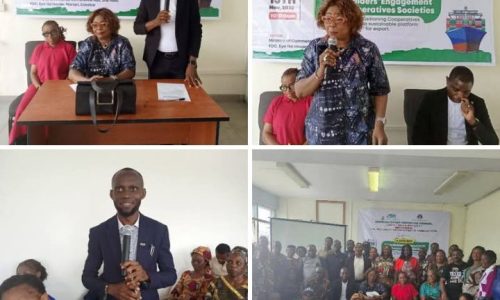CROSS RIVER’S UTIBE-ABASI BASSEY-DUKE ADVOCATES WOMEN’S EMPOWERMENT AT NATIONAL CASSAVA VALUE CHAIN WORKSHOP IN ABUJA
✓ Governor Otu’s Aide Joins National Stakeholders to Advance Gender Inclusion, Food Security, and Women’s Leadership in Agriculture
By Amawu, Cletus Albert Amawu | Curled from Calabargist.
Abuja, Nigeria — Cross River State took the spotlight at the National Workshop on Women in Nigeria’s Cassava Value Chain, as Governor Bassey Otu’s Special Assistant on Gender Mainstreaming, Utibe-Abasi Bassey-Duke, represented the state at the high-level event jointly organised by the Islamic Organisation for Food Security (IOFS) and UN Women.
The two-day workshop convened women leaders, policymakers, development partners, and private sector stakeholders to chart practical pathways for enhancing women’s participation, leadership, and access to opportunities within Nigeria’s cassava value chain.
Opening remarks and goodwill messages were delivered by Ms Beatrice Eyong, UN Women Country Representative, alongside senior officials from the Federal Ministries of Agriculture and Food Security and Women Affairs, as well as representatives from NEXIM Bank, GIZ, and other development partners. Speakers unanimously underscored the indispensable role of women in driving agricultural transformation and strengthening national food security.
A major highlight of the opening session was the presentation of survey findings by Dr William Agyei Manu, which offered fresh insights into the contributions, challenges, and opportunities for women in Nigeria’s cassava sector.
The presentation was followed by robust discussions centred on gender-responsive agricultural policies, access to finance, and frameworks for inclusive economic growth.
During a panel session themed “Women at the Heart of the Cassava Value Chain,” inspiring success stories were shared by women farmers, processors, and cooperative leaders who are driving innovation and impact within their communities. UN Women also showcased its Gender-Responsive, Climate-Resilient Agriculture Model, illustrating how inclusive and sustainable approaches can reshape cassava production and processing across West Africa.
The second day featured practical dialogues focused on unlocking finance and market access for women entrepreneurs. Key stakeholders, including representatives from the Bank of Agriculture, GIZ, NEXIM, OLAM, and the International Institute of Tropical Agriculture (IITA), presented actionable strategies to support women-owned agribusinesses and strengthen gender-sensitive policy implementation nationwide.
Utibe-Abasi Bassey-Duke’s active participation reaffirmed Cross River State’s unwavering commitment to gender equality, women’s economic empowerment, and inclusive agricultural development. Her engagement underscored the need to ensure that women farmers, processors, and entrepreneurs are not only integrated into agricultural value chains but also adequately supported to thrive.
Speaking on the sidelines of the workshop, Utibe-Abasi emphasised that empowering women in the cassava value chain is pivotal to achieving sustainable food security and building resilient communities across Nigeria.
“When women are given equal access to resources and opportunities, the ripple effect benefits families, communities, and the nation at large,” she affirmed.
Her representation marks yet another stride in Cross River State’s growing reputation as a champion of women’s advancement, gender inclusion, and sustainable development.
The National Workshop on Women in Nigeria’s Cassava Value Chain was jointly organised by the Islamic Organisation for Food Security (IOFS), a specialised institution of the Organisation of Islamic Cooperation (OIC), in collaboration with UN Women.
The workshop aimed to assess the current state of women’s participation in Nigeria’s cassava sector, identify existing barriers to gender inclusion, and propose evidence-based policy interventions to promote equality and economic empowerment.
Nigeria, being the world’s largest producer of cassava, relies heavily on women for production, processing, and distribution. However, systemic gender gaps in access to land, finance, and technology have limited their full potential.
The event, therefore, served as a strategic platform to foster partnerships among federal and state governments, international agencies, and private sector actors, with a shared commitment to empowering women, strengthening food systems, and building inclusive agricultural economies.



